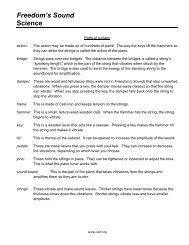Transcript - Izzit.org
Transcript - Izzit.org
Transcript - Izzit.org
Create successful ePaper yourself
Turn your PDF publications into a flip-book with our unique Google optimized e-Paper software.
MAN: And there we were at the end of the day. There’d been no fights or scrambles for peaches, no<br />
apples left to rot. And instead of the 200 cents we’d probably have made if we’d not adjusted the prices,<br />
we got nearly 600 cents to show for our troubles.<br />
WOMAN: It’s an unavoidable fact of life that goods have to be allocated somehow. And we’d<br />
discovered for ourselves that the price of goods can prevent fights or long queues on the one hand, and<br />
huge surpluses on the other. Am I right, or am I right And it all goes towards demonstrating a general<br />
principle that applies to marketing anywhere. It makes no difference whether it’s fish or furniture, kettles<br />
or computers, boots or books. Nothing has an absolute price or an absolute value. Take any commodity<br />
you care to mention- no matter how ordinary. Its value always depends on the circumstances.<br />
MAN: Take water, for example. In a country near the equator it can be very expensive, because it’s<br />
difficult to come by. And in the middle of the desert near an oil well in a country like this, a barrel of<br />
water can cost more than a barrel of oil. This chap is selling water and he’s doing very well. But in these<br />
same places dates can be so common, have so little value, that scarcely anybody bothers to pick them.<br />
WOMAN: On the other hand, there are some countries where dates are rare and expensive delicacies.<br />
Yet in these same places, water might cost next to nothing, because it’s so easy to come by.<br />
MAN: However, water is as essential to life here as it is anywhere on earth. If you live on the edge of a<br />
lake you might have thousands of times more than you need, so its price isn’t high. Just because<br />
something is high in demand doesn’t automatically mean it’s expensive. The balancing point is price. It<br />
regulates on the one hand - supply - and on the other hand – demand.<br />
WOMAN: The fascinating thing is: that if you go to any market or any shop, every price you see on<br />
every single thing that’s for sale has a story to tell. It tells you, for example, how plentiful or how scarce<br />
something is in relation to the number of people who are not only able to buy it, but are willing to buy it.<br />
MAN: Comparing prices can tell you a great deal about different things with similar characteristics. An<br />
avocado can weigh the same and may even have the same nutritional value as a potato, but the different<br />
price of each can tell you how much more difficult one was to produce than the other, or how far it had to<br />
travel and how much people want it.<br />
WOMAN: Changing prices make another interesting story. The way the price of cherries and of salmon<br />
changes between early May and late June can tell you a great deal about when cherries grow best, or<br />
about how easy it is to catch salmon or when the season is open or closed.<br />
MAN: But what price tells you about something has nothing to do with its absolute value. Price can only<br />
tell you about value relative to a particular place at a particular time - it’s the relationship between supply<br />
and demand.<br />
WOMAN: It’s like a pair of scales. The price pointer is in the middle if demand is on the right and<br />
supply on the left. When demand is great and supply is small, the pointer will move to a higher price, but<br />
when supply increases and demand decreases, the pointer moves to a lower price. And this tells us the<br />
first simple but important law of demand.<br />
MAN: The higher the price, the smaller the quantity that will be demanded.<br />
WOMAN: Or, if you prefer…<br />
37

















